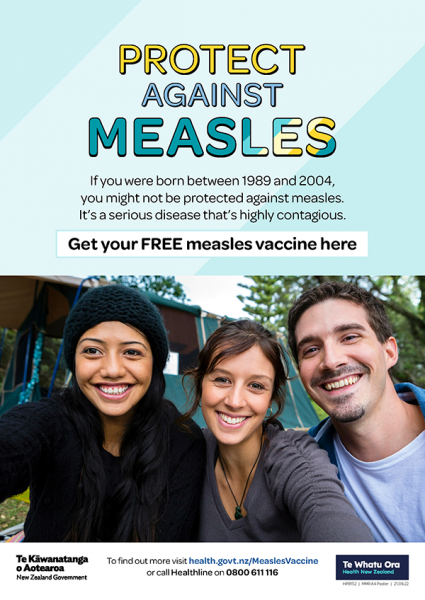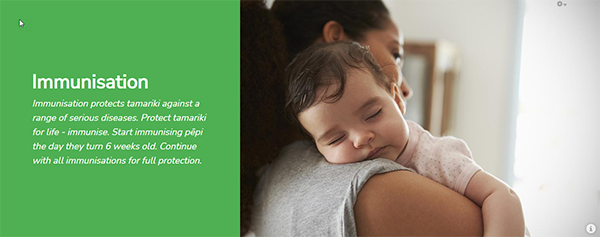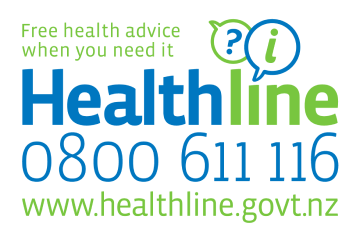Measles Immunisation
Measles Immunisation
Protect tamariki (children) against measles. It can be very dangerous and spreads faster than almost any other disease. If you're unsure whether your child has had their MMR immunisation, check with your Well Child Tamariki Ora provider or GP practice.
Key points about measles immunisation
- measles can be very dangerous
- measles spreads faster than almost any other disease
- immunisation is the only way to prevent measles
- pēpi (babies) need measles immunisations at 12 and 15 months
- measles immunisation is very important for Māori and Pasifika pēpi
How do you prevent measles?
Immunisation rates are low for all tamariki in Aotearoa. They are very low in Māori and Pasifika pēpi and tamariki.
This means there is a real risk of measles spreading widely and affecting Māori and Pasifika tamariki the most.
MMR vaccine is the only way to prevent measles
Having immunisation on time is the only way to prevent measles.
Unsure if your child has had MMR immunisation?
If you're unsure about whether your child has had their MMR immunisation, check with your:
- Well Child Tamariki Ora provider
- GP practice
Still unsure? It's safe to get 2 doses again
If you're still not sure, your child can have their the MMR vaccine anyway. It's safe to get 2 doses again.
MMR vaccine is the only vaccine to prevent measles in Aotearoa
Combined measles, mumps, rubella (MMR) immunisation is the only vaccine available to prevent measles in New Zealand.
Where to have measles immunisation
You usually need to take pēpi and tamariki to a GP practice for their immunisation.
Some pēpi and tamariki can have their immunisation from other services like Māori or Pacific providers or outreach services.
Check immunisation providers in your area.
How effective is immunisation against measles?
Two doses of the measles, mumps, rubella (MMR) vaccine is 99% effective in preventing measles.
Who should have MMR immunisation?
Babies and children at 12 and 15 months
Tamariki need 2 doses of MMR - a first dose at 12 months of age and a second dose at 15 months of age.
Babies and children 6 to 11 months during an outbreak
Pēpi and tamariki who have not had their MMR immunisation are at greatest risk of the disease.
Pēpi aged 6 to 11 months can have their MMR immunisation early if there is a high risk of exposure to measles (for example, during outbreaks).
Pēpi will still need MMR at 12 and 15 months because MMR immunisation tends not to work as well in young babies.
Teens and young adults
Many teens and young adults have missed one or both doses of MMR and may not be aware that they are not protected against measles. Check whether you're up to date with your MMR immunisation with your GP practice.
Tamariki with egg allergy
Tamariki with an allergy to egg CAN have MMR.
Who should not have the immunisation?
The following people should not have MMR immunisation:
- pregnant women
- anyone who has an illness, or is taking medicines, which affect their immune system
- pēpi under 12 months of age (except during a measles outbreak)
- tamariki who have had a severe allergic reaction (anaphylaxis) to a previous dose of the MMR vaccine
- tamariki who have had another live vaccine, including chickenpox or BCG, within the previous month
Book another time for your child's MMR if they have a sudden severe illness with high fever. Having a minor infection is not a reason to delay immunisation.
If you find out you are pregnant after having MMR immunisation, talk to your family doctor. But, research has found no injury to the unborn child when women have had MMR immunisation without realising they were pregnant.
Who should seek more advice before having MMR?
- anyone who has received human immunoglobulin or other blood product within the previous 11 months
- anyone who is HIV-positive
- anyone who is unsure if they have an immune deficiency or is taking medicine to suppress their immune system
- anyone who developed low platelets (idiopathic thrombocytopenia or ITP) after a previous dose of MMR
How safe is MMR?
The risk of MMR causing serious harm is extremely rare. MMR is considerably safer than getting measles.
Read about measles complications vs MMR immunisation side effects.
Can the MMR vaccine cause measles?
No.
It can cause a very mild, non-infectious rash about 5 to 12 days after immunisation.
Can MMR cause autism?
No.
Extensive research shows there is no evidence that MMR causes autism.
Does MMR contain thiomersal (or mercury)?
No.
Quick answers to frequent MMR questions
See the Immunisation Advisory Centre's quick answers to frequent MMR questions.
Watch Dr Hina Luti answer your questions about the measles vaccine (Ministry of Health - Manatū Hauora video)
See more KidsHealth content on immunisation
This page last reviewed 27 March 2023.
Do you have any feedback for KidsHealth?
If you have any feedback about the KidsHealth website, or have a suggestion for new content, please get in touch with us.
Email us now


